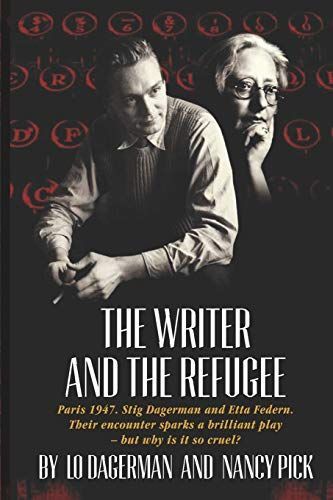
The Writer and the Refugee: Paris 1947. Stig Dagerman and Etta Federn. Their Encounter Sparks a Brilliant Play - But Why Is It So Cruel?
"A wonderful blend of literary and personal history. -- author Johannes Lichtman Sometimes life presents a mystery. An innocuous email from a stranger sets off a passionate journey of discovery. Why did Stig Dagerman, Swedish literary wunderkind (and Lo's father) write a shockingly cruel play based on Nancy Pick's relative, Etta Federn, the once eminent Austro-Jewish refugee he encountered in postwar Paris? What happened when Stig and Etta met? Nancy is determined to reclaim Etta [feminist, writer, single mother, radical - the relative nobody ever spoke about] from the shadows. Lo is searching for the father she never knew. Each simply has to know. Stockholm 1947. Stig Dagerman was the new-generation writer on everybody's lips. Over the previous two years, at breakneck speed, he had written two novels and a much-praised short-story collection; made a spectacular debut as a playwright; and reported from the ruins of postwar Germany in a book titled German Autumn, destined to become a classic. Now, he was being sent to France to pen a sequel. He will indeed write about postwar France, but in an entirely unexpected way. Instead of a journalistic account, he feverishly writes a new play, Marty's Shadow . The play was modeled on people he'd met in a dank refugee hotel in Paris: The Austro-Jewish writer Etta Federn and Michel, her younger son. When Stig meets Etta she is old and ailing. Her elder son, Jean, had died a hero in the French Resistance. She had been on the run from Nazis and fascists since 1932, when as a fifty-year old single mother, a Jew and a radical, she had fled Berlin for Barcelona, taking her two young sons with her. In Berlin, she had been widely recognized as a writer (most notable are her biographies of Walther Rathenau and Christiane von Goethe, the wife of Goethe); as an accomplished translator working in sixteen languages; and as a radical feminist and anarcho-syndicalist in the vein of Emma Goldman. In her new life in Barcelona she builds a reputation as someone with the power to interpret character by looking into your hands. (Paul Federn, her brother, was a well-known psychoanalyst who had worked with Freud.) In 2011, I am astounded to receive an email from Nancy Pick, an American relative of Etta's. Nancy has heard of Stig's play about Etta and her sons, and wants to know more. Anxious, but also intrigued, I search for a way to break the bad news to her: Stig's play is brutal, a punch to the solar plexus: a monstrous mother murdered by a son. Marty's Shadow brings Nancy and me together. It confronts us with a shared question - but one which we initially want to answer in different ways: What could have driven my father, the young writer Stig Dagerman, to paint such a cruel portrait of the brilliant, heroic refugee, Etta Federn? This book lays out our search for answers. Lo Dagerman